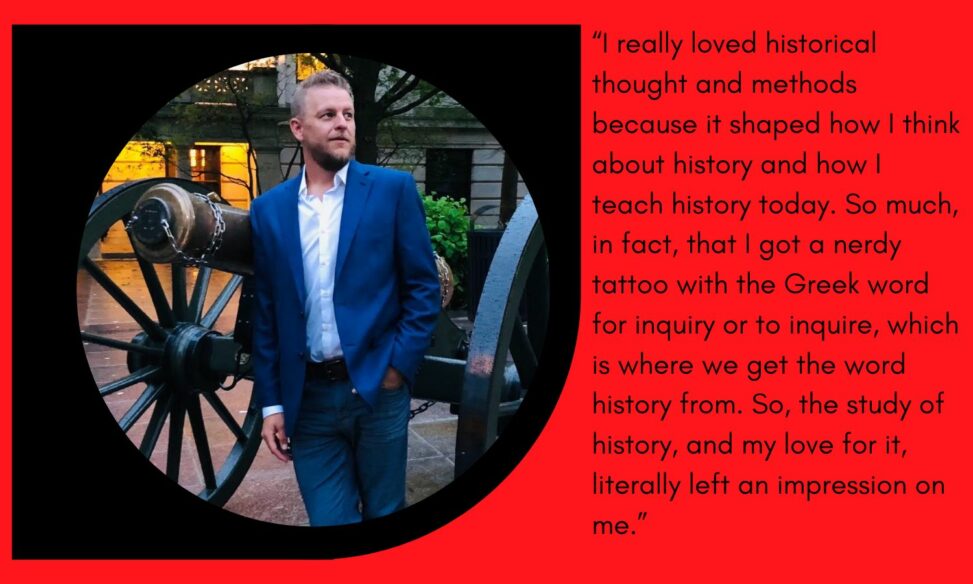I completed my first degree in media studies from UC back in 2007. After I graduated, I did a lot of production work, got married, bought a house, and had a kid, before I started teaching English as a second language on the side. I soon learned that I loved it, so I decided to go back to school to earn a second degree. I graduated in 2014 with a BS in Secondary Education social studies and a minor in history.
https://sites.google.com/view/wrobeson/home?authuser=0
What are you up to these days?
I currently teach survey courses on American history and courses that explore history through film and literature. But military history is my passion. I published a book in 2018 entitled Buttoned Up: American Armor and the 781st Tank Battalion in World War II, I lead a military history club over the summer, and I am always happy to talk to local audiences—academic and non-academic—about a variety of topics in American military history. For example I recently spoke at Mile 2 in Dayton on “complex system failure,” comparing American and German armor production, doctrine, and economics. I also write book reviews for academic and professional journals for the US Army Center of Military History, Marine Corps University Press, and the Journal of Military History. I peer review manuscripts for many university presses and also do research for the Institute for War and Democracy, which is affiliated with the National World War II Museum in New Orleans.
What did you focus on as a history student while at UC?
I was kind of all over the place. Since I was earning a second degree [my first was in media studies back in 2007], my main focus was on just doing well to turn in stuff that I really sweated over and was proud of so I could develop my research and writing skills as well as expand my knowledge.
Did you have any favorite history classes? Which ones and why?
One of my favorite classes was Hist3000 Introduction to Historical Thought and Methods with Dr. K [Dr. Longfield Karr]. Hist3000 was fascinating, stimulating, and really hard, which I appreciated. The second time through college, I really leaned into difficult stuff. I really loved historical thought and methods because the class shaped how I think about history and how I teach history today. So much, in fact, that I got a nerdy tattoo with the Greek word for inquiry or to inquire, which is where we get the word history from. So, the study of history and my love for it literally left an impression on me. Since leaving UC, I have taken more history methods classes and loved them all.
What skills have you picked up from studying history that has helped you beyond your courses?
Communication and really the importance of language, especially in writing. Learning to be very careful and mindful so that my audience can understand what I mean, whether they are reading my academic work or my e-mail. Also, I learned to accept criticism and how to be a critical reader. One of the biggest things that studying history helped me develop was stamina in reading, research, and writing. The more I do history, the less daunting finishing projects.
Any advice for current students?
Build networks; keep in touch with people you don’t think you’ll ever see again (or even those you don’t really care to see again) because it’s always nice to reach out to people. Go to conferences if you can; a lot of the work I’ve been able to do, and honestly just pure enjoyment, has been through meeting people, bouncing off ideas, or just sharing trivia with other people studying history. Continue writing and always take criticism constructively. If you think you’re a great writer, you probably aren’t—so keep working on it; keep taking the criticism that professors give you to help you improve. If you do, you will get better. Lastly, look for opportunities to write and look for opportunities to read.

Leave a Reply